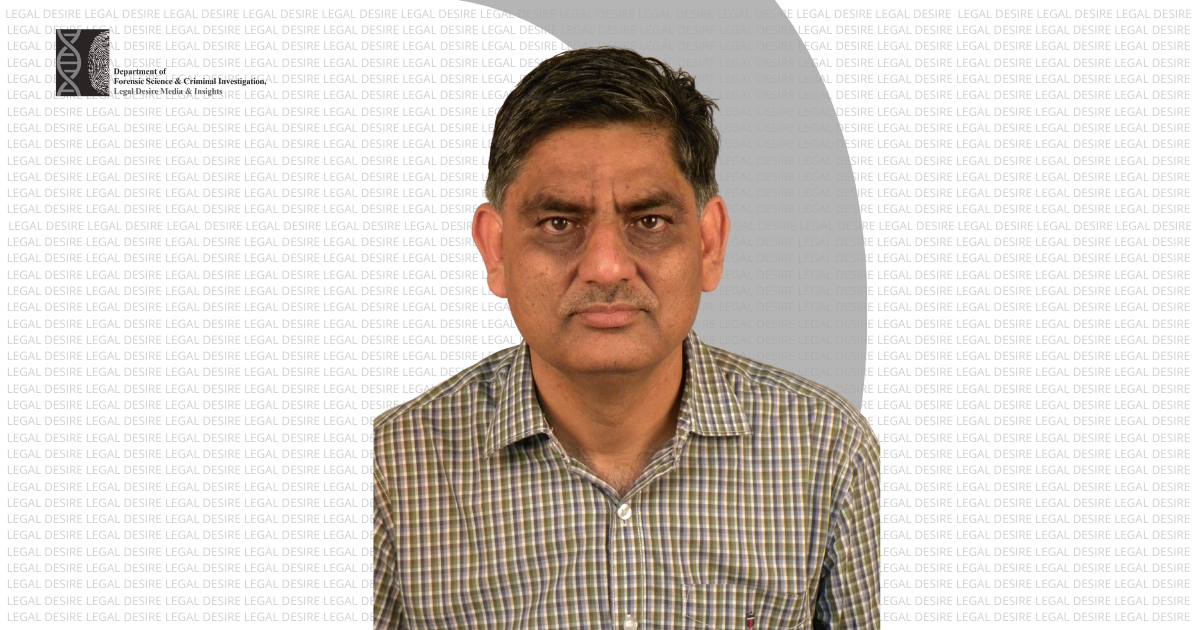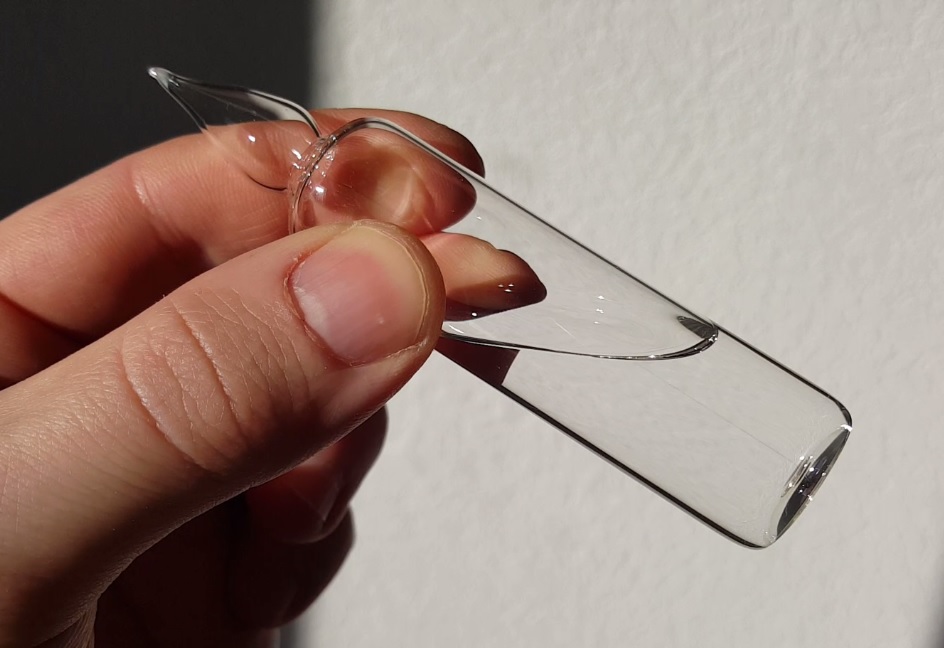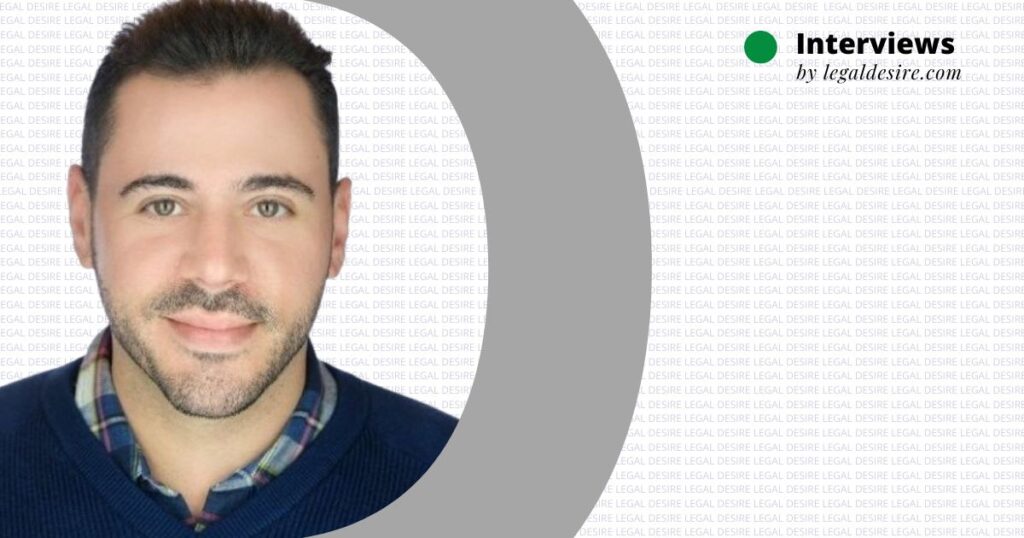Now Reading: In Conversation with Dr. R. K. Sarin, Director, Andhra Pradesh State Forensic Science Laboratory
-
01
In Conversation with Dr. R. K. Sarin, Director, Andhra Pradesh State Forensic Science Laboratory

In Conversation with Dr. R. K. Sarin, Director, Andhra Pradesh State Forensic Science Laboratory
Dr. R. K. Sarin is the Director of Andhra Pradesh State Forensic Science Laboratory, India. Dr. Sarin has completed his Masters in Chemistry in 1978 and his Doctorate in Chemistry (1993) on “Investigation of Coordination compounds of Lanthanides with some Schiff bases Derived from Amino Antipyrine and Isonicotinic Acid Hydrazide” as well as passing the Public Analyst Examination conducted by Ministry of Health & Family Welfare, Government of India. Dr. Sarin started his career as a Forensic Scientist in the year 1980 from FSL, Madhuban after serving other National Laboratories viz. Central Revenue Control Laboratory, Central Board of Excise & Customs, M/O Finance, Govt. of India and Food Research & Standardization Laboratory, Directorate General of Health Services, Ministry of Health and Family welfare, Govt. of India from 1986 to 1995. He joined the Central Forensic Science Laboratory [CFSL], Chandigarh, Ministry of Home Affairs, Govt. of India in the year 1995 as the Asst. Director (Chemistry) and further he worked in Central Forensic Science Laboratory, Ministry of Home Affairs, Govt. of India, Hyderabad as Asst. Director Chemistry/Dy. Director Toxicology till 2010. Afterwards he was appointed as Director In-charge for establishing Central Forensic Science Laboratory [CFSL], Bhopal Ministry of Home Affairs, Govt. of India, and he worked there till 2012. In the year 2013 he was appointed as Director, State Forensic Science Laboratory, Delhi, Govt. of NCT and he worked there till 2016. In the year 2016, he was also appointed as Director, Central Forensic Science Laboratory [CFSL], Hyderabad MHA, Govt. of India and he worked there till his Superannuation i.e., June 2017. In February 2018, he was again appointed as Director, Andhra Pradesh State Forensic Science Laboratory, Govt. of AP.
In the years 2011-2012 he has the credit of establishing of Central Forensic Science Laboratory [CFSL] in temporary premises at Bhopal and also initiated establishment of CFSL, Bhopal in permanent premises.
In the years 2013-2016 he has the credit of upgrading the Delhi State Forensic Science Laboratory, Government of NCT of Delhi at Rohini, Delhi by creating additional infrastructure, accommodation and human resources and reduced the huge pendency of crime cases waiting 3 to 7 years for Forensic Examination. For capacity building of Forensic examination of crime cases he established one more Regional Forensic Science Laboratory at Chanakyapuri, Delhi, apart from establishing 24 x 7 Mobile Crime scene facility at State FSL, Rohini, Delhi.
At present he is establishing Andhra Pradesh State Forensic Science Laboratory at Tech Tower, Mangalagiri in temporary premises to quick start the facility of Forensic Examination of Crime cases and also establishing APSFSL in permanent premises at Amaravati, the new capital of Andhra Pradesh. He is also putting efforts to upgrade the five Regional Forensic Science Laboratories in 5 districts of Andhra Pradesh and also establish new Regional Forensic Science Laboratories in remaining 8 districts of Andhra Pradesh.
He has completed two Research Projects entitled “Feasibility Project under Non Plan entitled “Development of Analytical Methods for the Detection and Estimation of Diazepam in Non-alcoholic Beverages and Fruit Drinks of various makes” (in the year 1998) and “Creation of Centralized Data Bank for source identification of Opium” (Under IX Plan-1997 to 2002) as a Project leader.
He attended and assisted in conducting Test for Scientific Investigations in All India Police duty meet at Mysore in 2004.
He has Conducted national/international Level training programmes/workshops as Course Director/Course Coordinator on the subjects of Narcotics/Toxicology/Food contaminants and Accreditation of Forensic Science Laboratory and also delivered lectures in various training programmes/seminars/workshop to Scientists/Police Officers on various topics of Forensic Science at training schools of Bureau of Police Research and Development, National Institute of Criminology and Forensic Science, Judicial Academy at District Court, Karkarduma. Various Police training colleges / schools, Delhi Police, Union Territory Civil Services Training Academy, Delhi, courses of judges conducted by Forensic Science Laboratory, Sagar, M.P., State Counsel of Science, Bhopal, M.P. and delivered lecture in Maharishi Dayanand University (MDU) Rohtak, Amity University, Bundelkhand University, Delhi University, Punjabi University, Galgotias University, Kurukshetra University, Sam Higgin bottom Institute of Agriculture, Technology and Science and Forensic Science Laboratory, Shimla and Regional Forensic Science Laboratory, Dharamshala, Himachal Pradesh, Shri Vaishnav Vidyapeeth Vishwavidyalaya university, Indore, Madhya Pradesh and BT Institute of Excellence Sagar, Madhya Pradesh.
He acted as examiner for Thesis submitted for PhD Degree for Gujarat University-Ahmedabad, Bundelkhand University-Jhansi, Amity University-Noida, Punjabi University-Patiala, Punjab University-Chandigarh. He has also acted as Theory/Practical examiner and Paper Setter for M.Sc. Forensic Science courses of LNJP National Institute of Criminology Forensic Science-Delhi (IP University), Kurukshetra University, University of Delhi, Maharishi Dayanand University Rohtak, Osmania University-Hyderabad, Amity University-Noida, Galgotias University-Noida, Punjabi University-Patiala, Punjab University-Chandigarh.
He published his Research contributions in the form of 65 research papers in various National and International journals of repute and also his 33 research papers were accepted for oral/poster presentation in various National and International Conferences/Seminars. He has guided 15 Research Scholars for the aware of PhD Degree in Chemistry/Forensic Science.
In the year 2010 he visited Federal Bureau of Investigation (FBI) Forensic Laboratory, Quantico, Virginia, USA in the Govt. of India, Ministry of Home Affairs [MHA] interactive program of Central Forensic Science Laboratory [CFSL] Forensic Scientist with the Forensic Scientist of FBI.
During his Directorship, CFSL Hyderabad was assessed by Ministry of Electronics & Information Technology GOI as per Sec.79 A of Information Technology Act as for notifying CFSL Hyderabad as Examiner of Electronic Evidence. He & his team of CFSL was also appreciated by committee of Hon’ble Judges of High Court of Delhi, Punjab and Haryana for proving the technical inputs for the making draft rules under Sec.79 A of IT Act-2000 for the digital evidence admissibility in the courts of law.
He has received various many awards & appreciations for his outstanding contribution in Forensic Science.
He attended and he was member of organising committee to conduct the Police duty meet competitions in 1st (63rd) AP Police Duty meet from 4th Jan 2021 to 07 Jan 2021, Tirupathi, Andhra Pradesh. He also acted as a judge in various Forensic competitions in the duty meet.
What inspired you to join the Forensic domain during those early days, when there wasn’t much awareness about Forensics in India?
A penchant liking for Chemistry and its applications in various fields especially dealing with Criminal Investigations had drawn me towards the study of Forensic Science as a speciality to bestow Justice to the society in an unbiased and demonstrable manner using scientific techniques.
You have served as the Head of the Central & State Forensic Lab in different states of India during your tenure. In your experience, how different is it to head a Central Forensic Lab and a State Forensic Lab?
In the CFSLs (Central Forensic Labs) experience has been quite invigorating as the challenges were of national and international in nature. In the charter of duties of CFSL’s (Central Forensic Lab’s) focus is on Research & Development in the field of Forensic Science for developing more sensitive and accurate new methodologies and techniques. While in the charter of duties of State Forensic Labs focus is on the case examination work.
I could leverage knowledge and experience in bringing about a change in the operational infrastructure with technological advancements being adapted for quick turn-around times and accuracy in the areas of forensic investigations and reporting.
The same has helped me in the capacity building process.
In the year 2001, The Central Forensic Science Laboratory [CFSL], Hyderabad became the first NABL [National Accreditation Board for Testing and Calibration Laboratories] accredited Forensic Science Laboratory of India. As you played an active role in the accreditation, what challenges were encountered by you in the process as it hadn’t been done earlier? How important is it to get a Forensic Science Laboratory accredited?
Compliance of stringent international level criteria of management and technical requirements with inadequate funds & staff was a big challenge for the accreditation of CFSL, Hyderabad. Lack of documentation of procedures & practices followed in the laboratory, regular calibration of equipment’s, availability of CRM’s/SRM’s & regular assessment of proficiency of the laboratory by entering in the international proficiency testing programme were some of the lacunae.
The world has become a Global Village and with the varied nature of crimes being committed, Forensic Science plays a key role in the establishment of the crime with thorough investigations and reporting. Authenticating the reports generated by a laboratory is very important for justice to be delivered. NABL certification develops Confidence of Judiciary & Investigating agencies in the Forensic reports, thus reduces multiple testing.
Hence, I personally believe NABL accreditations are important for forensic labs.
Many Central & State Forensic Laboratories in India were upgraded and established under your supervision. How demanding was this task of capacity building?
It was quite demanding and a herculean task as the transition had to take place both in the personnel and the infrastructure to suit the modern requirements challenges of the forensic investigations and reporting.
During my serving in Forensic Labs as bench worker & supervisor I found the improper combination of the essential three components of capacity building i.e., accommodation, human resources, infrastructure including machinery equipment and consumables resulting in pendency of cases & facilities especially in new upcoming forensic fields like Audio Video authentication, Cyber and DNA Forensics.
When I joined as Director of CFSL / SFSL, I simply made an assessment of actual requirements of these three essential requirements (essential three components of capacity building i.e., accommodation, human resources, infrastructure) after taking feedback from my fellow scientists who were actually involved in practising the case examination process.
After the assessment, I requested the Government for financial sanctions for the same and implemented the proposal in mission mode. I am fortunate that all my Superiors/Bosses & Colleagues supported me wholeheartedly resulting in capacity building.
Being involved with academics as a member of Board of Studies for drafting and revising the curriculum, Research Guide, Theory & Practical Examiner and Guest Faculty to various Forensic colleges and universities, supervising research scholars of Directorate of Forensic Science Services Fellowship, & Evaluation and assessment of dissertation & thesis on various topics related to forensics, how did you manage it along with the administrative work at the FSL?
The administrative work at CFSL/SFSL was a huge responsibility entrusted to me by the Government. I only try to optimize the available resources (team and infrastructure) and deliver the best at all times.
It’s to do with liking your subject and dedication towards the duty and social responsibility. It has been a satisfying journey as I always believe the knowledge gained has to be shared and further enhanced to benefit the society at large.
You have been conducting various in service training programmes on different topics related to Forensics for different Central & State government agencies and invited to participate as Guest Speaker in various training courses conducted by training schools of Bureau of Police Research and Development [BPR&D], National Institute of Criminology and Forensic Science [NICFS], Judicial Academies, Police Academies, Civil Services Training Academy & Forensic Science Labs, how demanding was it to convey the scientific terminologies to people from different backgrounds from the same platform?
Different type of audience requires different matter to be discussed during the talk/presentation. Students need more academic inputs while Police/administrative/Judicial officers require more inputs on the use of Forensic Science in Investigations and in-service Forensic Scientists require knowledge of the use of latest techniques and intricacies encountered while examining the cases in the laboratories.
If the talk/presentation is appropriately made, the audience take keen interest and interact to clarify their doubts otherwise the presentation becomes monotonous.
Indeed, it was a challenging task to train people from different backgrounds but not from the forensic domain. But I was happy to see the people involved were keen to develop skills and took special interest to learn the scientific terminologies.
What challenges were encountered while dealing and processing the evidences submitted to the Forensic Lab by the police and various other government agencies during the early days when awareness about Forensics was not much in the county?
It was quite challenging to establish a crime without forensic scientific reporting.
During the early days, the Public & the Police were not knowing the importance and effectiveness of Forensic Evidence in delivering the Justice for the criminal justice system.
Obviously, Forensic Science laboratories were facing problems like police not sending appropriate evidence properly packed and preserved to avoid contamination and degradation of Forensic sample.
Even Investigating Officers were not able to ask appropriate questions/nature of examination required. The pieces of evidence produced by the Police and various government agencies were limited in delivering justice by the honourable courts. Awareness of Forensics is of utmost priority with the ever-changing nature of crimes, modus operandi and criminal psychology.
There might have been various instances, when you were called for inspecting the crimes scenes by the IO/Police Unit. How challenging was it to deal with it apart from the lab work?
The preliminary work with respect to a case starts at the crime scene spot from where the material collected is always analysed at the forensic laboratory.
Visiting crime scene is fieldwork for forensic scientists. Actually, both are just like hands & gloves and are complementary to each other in fact knowledge of forensic testing in laboratory is mandatory for collection of appropriate Clue material without contamination & loss of its physical and chemical properties, so that the same can be analysed in the laboratory giving useful results for establishing the link between the criminal/victim with the crime scene.
Indeed, visiting the crime scene in addition to laboratory work is tiring but the pleasure of collecting crucial clues which can give break-through in the case is immense. As a moral duty, every forensic scientist should voluntarily provide his service for visiting the crime scene.
After the lab examination of the case evidences, you might have been called in the court of law on many instances to testify about a particular case either from the Prosecutor/Defendant side. What challenges were encountered by you while giving your opinion in the court where the people lacked the scientific understanding about the Forensics?
Definitely it has been a tough task to convince people (prosecution/defendant lawyers) on crime-related matters during the court proceedings. In most of the Hon’ble courts of law, the examination in chief and cross is based on a chain of custody and integrity of the physical evidence, but very less is asked about methods of scientific evaluation of physical evidence. Moreover, in most of cross-examinations the defence generally asks answers in yes or no and not allowing the experts to volunteer explanation which is must in science for arriving at the correct decisions.
Most of the professionals working at various FSLs are overburdened by the casework. But you managed to indulge into research work in spite of all this. How important is it to do so?
To carry out research for the development of forensic science is my passion & when the job or work you involve becomes your passion, it becomes more essential to dedicate yourself to the task assigned. Research in Forensic Science is application-oriented/job related and can be performed along with the routine work by extending the work already carried out for case examination.
CLUES/MFSL teams were established at the DSP level during your tenure in the state of Andhra Pradesh after the separation of Telangana from Andhra Pradesh. What role do these CLUES/MFSL team play in the crime investigation?
The CLUES/MFSL were established to ensure a quick visit to the crime scene by a trained professional leading to effective collection of the clues leading to establishing the crime by forensic experts in the judiciary.
Having worked for almost 4 decades in the Forensic Domain, you have received many appreciation letters, awards and recognition for your outstanding contribution from the government. What are some of them?
I was awarded Prestigious Union Home Minister’s Award for recognition of outstanding contribution in the field of Forensic Chemistry during the All India Forensic Conference organised by Directorate of Forensic Science Services MHA Govt. of India in the year 2007 at Kolkata.
Special recognition and appreciation were given during my directorship in Central Forensic Lab., Hyderabad to me in person & to my team of experts on 05.12.2016 by the team of judges of Hon’ble High Courts of Delhi, Punjab and Haryana during their visit to Central Forensic Lab., Hyderabad for providing the technical inputs for making the draft rules under section 79 A of IT Act-2001 for the digital evidence admissibility in the courts of law.
Received Special recognition and appreciation on 25.01.2017 in person from the members of Guwahati High Court PIL Committee for providing suggestions towards the improvement in the functioning of State/Regional FSL, Assam, Jorhat (India).
Awarded fellowship of Indian Medico-Legal Association of India in the conference organised by Indian Medico-Legal Association of India held in Oct. 2017 at Agra (India).
I was awarded Lifetime Achievement Award by Forensic Science Development Society, Lucknow (India) in the International Conference on Advances in Forensic DNA Technology organized by Bundelkhand University, Jhansi (India) from Feb. 22-24, 2018 held at Dr APJ Abdul Kalam Institute of Forensic Science, Bundelkhand University Jhansi (India)
I was awarded “Best Forensic Expert Award in Toxicology & Chemistry Division” in the International Forensic Science & Criminal Investigation Summit & Awards 2020 in association with Legal Desire Media & Insights.
——————————————————————————————————————–
The interview was first published in Forensic Reporter February Issue 2021.









